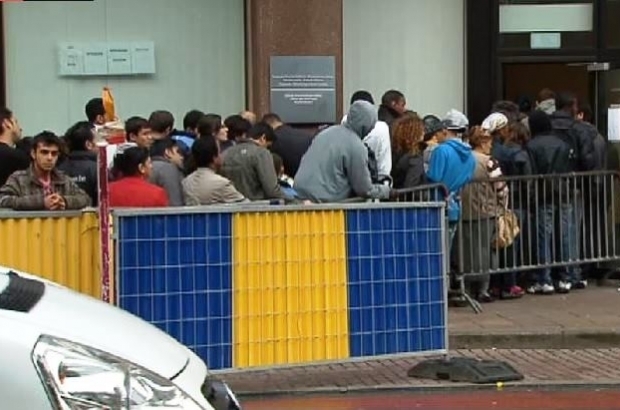- Daily & Weekly newsletters
- Buy & download The Bulletin
- Comment on our articles
Asylum crisis: Organisations 'powerless' as winter approaches
Aid organisations in Brussels are warning that the asylum crisis is far from resolved and there still are not enough places to house refugees as the cold winter months approach.
Médecins Sans Frontières (Doctors Without Borders) said the incoming federal government is nevertheless considering cutting the number of available reception places for asylum-seekers, which it has called “a destructive strategy”.
The number of asylum seekers who cannot get into a reception centre is 3,361, according to Fedasil's latest figures, down almost 16% since the beginning of August but still enough to continue to overwhelm the Belgian system.
Brussels aid organisations have said that they are still struggling to place single male asylum seekers in shelters. With women, children and families given priority, these refugee men often end up sleeping on the streets.
And the inflow figures are soaring: at the current rate, 2024 is on track to go down in history as a record year, with the main countries of origin for refugees in August being Syria, Palestine and Afghanistan.
“We notice that more and more people come knocking at the socio-legal support service that the non-profit organisation Pigment organises with us every Monday,” said An Vandermeulen of arts house Globe Aroma, which works with newcomers and refugees.
“Even on other days, asylum seekers are at our door with all kinds of questions. Unfortunately, we often cannot help them and we notice, for example, that there are fewer squats to which we can refer people who are looking for a roof over their heads. We cannot just take over the role of the government.”
Médecins Sans Frontières is preparing for a rough winter.
“We’re getting ready for a scenario where it is all hands on deck, using more volunteers and more of our own resources,” said spokeswoman Emmy Deschuttere.
“There has been a new audience knocking on the door of our operation for several years now, and the pressure on our staff is now chronically high.
"At the Humanitarian Hub, the day centre where we operate, our medical and psychological consultations initially focused on transmigrants.
"Now more than 60% of them are asylum seekers who are without shelter. Their medical assistance is actually the government's job."
Brussels hospitals are also having to step in, Deschuttere said, explaining that Médecins Sans Frontières cannot always conduct a follow-up and so refugees with medical conditions instead flood emergency rooms.
While asylum seekers are entitled to have their medical costs reimbursed by Fedasil, the red tape involved is often an obstacle.
But asylum and migration secretary Nicole de Moor’s office notes optimistic outflow figures for reception centres. Some 2,887 people left the reception centres in July and 2,376 asylum seekers did so in August. Usually, the monthly outflow does not exceed the 2,000 mark.
“The outflow is so high because more decisions on applications were taken, but also because more working asylum seekers sought their own accommodation,” a statement from her office said.
“Since 1 July, working asylum seekers have had to pay a contribution to stay in a reception centre. Some prefer to rent something themselves rather than stay in a reception centre where they have to share a room with other asylum seekers.”
At the same time, Fedasil is barely managing to create additional reception places. At the beginning of this year, the reception network had almost 35,800 beds. Today the figure stands at 35,817.


















